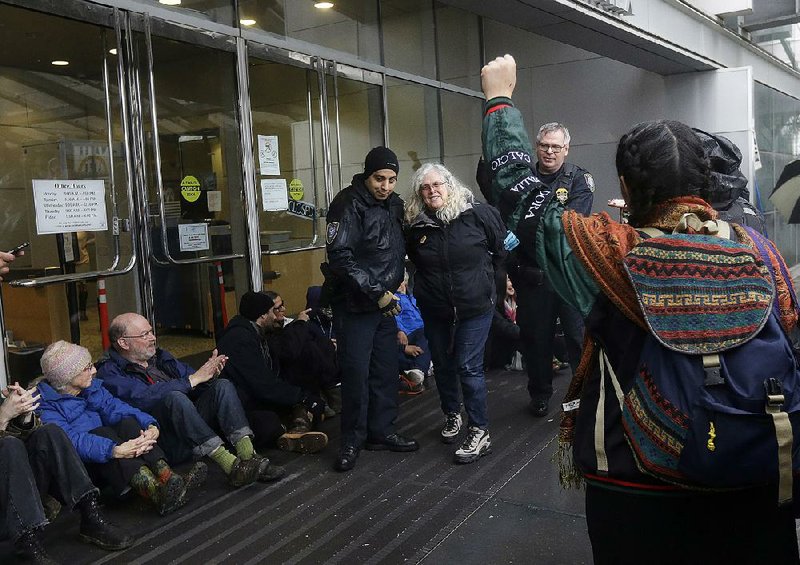CANNON BALL, N.D. -- With the green light from the federal government, the company building the Dakota Access oil pipeline said Wednesday that it plans to resume work to finish the long-stalled project.
Opponents of the $3.8 billion project meanwhile protested around the country in an action some dubbed their "last stand."
The Army on Wednesday granted the developer of the four-state oil pipeline formal permission to lay pipe under a Missouri River reservoir in North Dakota, clearing the way for completion of the disputed project.
"We plan to begin immediately," Vicki Granado, a spokesman for Dallas developer Energy Transfer Partners, said in an email Wednesday night.
Work had been stalled for months because of opposition from the Standing Rock Sioux, but President Donald Trump last month instructed the U.S. Army Corps of Engineers to advance the pipeline construction.
"Now, we all need to work together to make sure the project is completed safely and with as little disruption to the community as possible. This has been a very difficult issue for everyone who lives and works in the area," U.S. Sen. John Hoeven, R-N.D., said in a statement announcing that the final easement had been granted.
Some members of the Standing Rock Sioux tribe, which has been at the center of the controversy for nearly a year, urged on social media "emergency actions." The nonprofit Indigenous Environmental Network told people to target fuel-transportation hubs and government buildings, and to expect violence and mass arrests.
Protesters posted an online list of about 50 events nationwide. There were large rallies, including one outside the White House, and smaller ones, such as in Des Moines, Iowa.
A group of protesters in Chicago targeted a bank, and another group went to an Army Corps of Engineers office in New York City but was asked to leave when people started filming without a permit. Several people were arrested for blocking public access to a federal building in San Francisco.
"Today begins the next phase of mass resistance to Donald Trump's toxic Dakota Access pipeline," said Dallas Goldtooth, executive director of the Indigenous Environmental Network. "This is our land, our water, our health, and our culture at stake -- and if Donald Trump thinks we will give all of that up without a fight he is wrong."
The Corps of Engineers manages the river and its system of hydroelectric dams, which is owned by the federal government.
The pipeline under the Missouri River reservoir in North Dakota is the last big chunk of construction in the project.
The tribe maintains that the move will violate its treaty rights, and its attorneys have vowed to keep fighting in court.
The 1,200-mile pipeline would carry North Dakota oil through the Dakotas and Iowa to a shipping point in Illinois. Construction is nearly complete but has been stalled while the Corps and Energy Transfer Partners battled in court over the final segment.
The Standing Rock Sioux tribe, whose reservation is just downstream from the crossing, fears a pipeline leak would pollute its drinking water. The tribe led protests last year that drew thousands of people who called themselves "water protectors" to the encampment near the crossing. Protesters and police sometimes clashed, leading to nearly 700 arrests.
Energy Transfer Partners says the pipeline is safe.
The protest camp's population has recently thinned to fewer than 300, and the Corps has notified remaining protesters that the government-owned land will be closed Feb. 22.
On Wednesday, police or pipeline security officials continued to monitor the camp from nearby hills, as they have done for months. In the camp, few people were outdoors, where the wind chill sank to minus-20 degrees. The tribe has told camp occupants to leave, although there has been no effort to remove them.
A new camp is being established on private land, said Payu Harris, a pipeline opponent who has been at the camp since April.
"This is not over. We are here to stay. And there's more of us coming," he said.
Chase Iron Eyes, an American Indian activist who has called on people to return to the main camp rather than leave, encouraged that again in a statement and on social media.
"I'll see you on the front line," said Iron Eyes, who is facing a felony charge, accused of inciting a riot during protest action last week near the camp.
Members of the National Sheriffs' Association met Tuesday with President Donald Trump in the White House to request federal assistance dealing with demonstrators at the camps.
Law enforcement officials in the pipeline area feel stymied by the protesters' ability to retreat to reservations -- federal land where police and sheriff's deputies have no jurisdiction, Sheriff Paul Laney of Cass County, N.D., told reporters Tuesday night.
With the support of other sheriffs from around the country, Laney met with Trump and Homeland Security Secretary John Kelly to seek help from Customs and Border Patrol agents, U.S. Marshals, the Drug Enforcement Administration, and the Bureau of Alcohol, Tobacco and Firearms, as well as a stronger response from the Bureau of Indian Affairs.
"That, we feel, would alleviate a lot of issues," Laney said. Greg Champagne, sheriff of St. Charles Parish, La., and president of the association; and Carolyn Welsh, sheriff of Chester County, Pa., were among the sheriffs who backed Laney's request for federal assistance.
Laney said Trump and Kelly did not commit to providing additional federal help with the protesters, but, he said, the president is "very well aware of the Dakota pipeline. We feel very confident that our requests have been heard and are being considered." Laney said requests were made to President Barack Obama's administration for months and were denied.
Information for this article was contributed by James MacPherson and Blake Nicholson of The Associated Press; and by Tom Jackman of The Washington Post.
A Section on 02/09/2017
